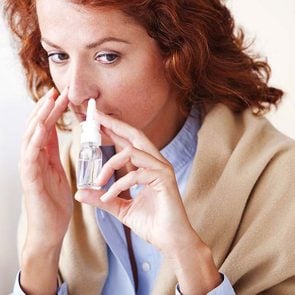Everything You Need to Know About Allergy Shots
Updated: Oct. 10, 2022
Allergy shots can be a long-lasting solution for people with certain allergies. Check out what allergists need you to know before you start.
On This Page
What are allergy shots?
There are a lot of reasons you may have spent the week a sniffling, sneezing mess. Sometimes, you’ve come down with a cold. A lot of times, you’re dealing with allergies.
Thankfully, there are a number of treatments for allergies, whether yours come and go with the season or stick around throughout the year.
Most methods involve treating the symptoms of an allergic reaction—you know, the runny nose or congestion, sneezing, coughing, and itchy, watery eyes.
Allergy shots, also known as subcutaneous immunotherapy, are the only treatment that changes the immune system to prevent allergies from occurring.
“They are liquid extracts that contain common allergens, such as grass, trees, pets, and dust mites, which are injected just below the skin,” says Gary Soffer, MD, a pediatric allergist and immunologist with Yale Medicine in New Haven, Connecticut.
They can help treat allergic conditions affecting the nose and eyes, ears, lungs, and even address allergic reactions to severe insect stings, according to the American College of Allergy, Asthma, and Immunology (ACAAI).
Allergy shots are a treatment for allergic rhinitis but can also be helpful for asthma and eczema, Dr. Soffer says.
How do allergy shots work?
Typically, our immune system reacts well to things that can cause us harm, like bacteria or viruses. But occasionally it can work against us.
If you have an allergy, your immune system may go to war over a substance that doesn’t cause an issue for other people—pet dander, for instance. Thinking the dander is a foreign invader in your body, your immune system will rally its troops (antibodies known as immunoglobulin E, or IgE) to fight off the perceived enemy.
The IgE prompts histamines into action, and it’s these chemicals that cause allergy symptoms like a runny nose and sneezing.
Allergy shots essentially train your immune system not to overreact. The hope is that after enough exposure, your body won’t jump the gun at the first sign of an allergen.
“We don’t fully understand all of the details of how allergy shots work, but essentially they help to retrain the immune system by introducing the allergen to the body in very small quantities,” Dr. Soffer explains. “This helps to build the arm of our immune system that supports tolerance of these benign substances.”
Practically speaking, they work like a shot: An extract (a small amount of the allergen) is injected into the skin of the arm, according to the ACAAI.

What allergies do they treat, and do they really work?
Allergy shots are used for environmental (outdoor and indoor) allergens—including trees, grasses, weeds, mold, house dust, and animal dander—as well as for stinging insect allergies, Dr. Soffer explains.
If given correctly, allergy shots are “very effective” in treating various types of allergies, he says.
The American Academy of Allergy, Asthma, and Immunology explains that the shots can decrease symptoms of many allergies and prevent the development of new allergies.
They can also prevent the progression of allergic rhinitis to asthma in children. Effectiveness can vary depending on the dose of the allergen and the length of treatment.
Insect allergies
Shots for insect allergies involve the venom of the insect, which is administered gradually in increasing doses. Eventually, it will decrease the patient’s sensitivity to the allergen, explains the ACAAI.
In a period of weeks to months, an individual who was at risk of a potentially fatal allergic reaction can live a normal life.
Allergic rhinitis
Dr. Soffer points to an extensive body of evidence, going back as far as 1911, showing how effective allergy shots can be for seasonal and environmental allergies.
“Studies have shown they are especially effective for pollen, animal dander, mold, dust mite, and cockroach allergies,” he explains.
A small study, published in 2016 in Annals of Allergy, Asthma, and Immunology, found that allergy shots reduced symptoms by 55 percent after three years of therapy and effectively decreased the amount of medication needed for relief of symptoms by 64 percent.
Eczema
An intriguing case study published in Annals of Allergy, Asthma, and Immunology makes the case for allergy shots as a treatment for severe atopic dermatitis, aka eczema.
Treatment involves injecting eczema-triggering allergens into the individual. After a year of it, the patient reported an improvement in symptoms.
Asthma
Allergy shots can also be effective in treating allergic asthma by relieving the allergic reactions that trigger asthma episodes, per the ACAAI. This will effectively enhance breathing and reduce the need for medications.
Who should get allergy shots?
Any patient above the age of five who is dealing with environmental allergies should be considered for allergy shots, says Dr. Soffer, especially those who are unable to manage their symptoms with medication and environmental control measures.
Certain patients, such as those with unstable asthma, “who should have an extended conversation with their allergists about increased risks,” Dr. Soffer says.
The same goes for people taking certain medications. If you take beta blockers, for instance, your doctor may recommend against immunotherapy because the drugs have been found to blunt the effect of epinephrine, the lifesaving treatment for anaphylactic shock.
How often do you get allergy shots?
Allergy shots require commitment. Don’t expect to go in for a quick jab and be done with your allergies for good. The process can take up to five years.
There are two phases to allergy shots, often referred to as a schedule.
Buildup stage
The first phase is a buildup phase when the amount of allergen in the shot is increased with each visit. “Buildup phases tend to vary quite a bit but can be weekly for up to six months,” explains Dr. Soffer.
Generally speaking, you’ll get an allergy shot one to three times a week for three to six months.
Maintenance
When you reach a high enough dose, you’ll transition to a maintenance phase.
“Maintenance phases are typically monthly shots that should last for three to five years,” says Dr. Soffer.
How do you prepare for allergy shots?
There is little preparation involved prior to getting allergy shots.
That said, Dr. Soffer suggests planning to be observed in the clinic for at least 30 minutes post shot for any signs of allergic reaction. If you do have a reaction, your doctor will be on hand to treat it.
Also, if you’re feeling unwell, tell your doctor so you can reschedule your shot. Sometimes illnesses like a cold can exacerbate side effects.
Allergy shot side effects
Allergy shots are generally very safe. “Most commonly, patients can develop large, local reactions that cause redness and itching,” notes Dr. Soffer.
The site of injection can look like a mosquito bite or as if you broke out in hives. This is normal and usually goes away after a few hours.
But considering that allergy shots involve injecting an allergen into your system, they can incite an allergic reaction, “ranging from nasal congestion to fatal anaphylaxis,” Dr. Soffer notes.
If you experience mild allergy symptoms like nasal congestion, sneezing, or redness and itching, your allergist will likely recommend an antihistamine to curb your symptoms.
You can also experience difficulty breathing or dizziness, signs of anaphylaxis, which can occur half an hour after the injection. If this is the case, your allergist will monitor your symptoms until they subside.
Now, it’s important to note that while there’s a possibility of fatal anaphylaxis, it is exceedingly rare—about 1 in 2.5 million injections.
Doctors like to be on the safe side, which is why allergy shots are given in an allergist’s office by a professional and credentialed doctor. It’s also why you’ll stick around for a half-hour after getting your shot.
If you’re dealing with reactions from your shots, your doctor may recommend you take an antihistamine beforehand. Doing so can prevent reactions, particularly at the injection site (but won’t stop anaphylaxis). But talk to your doctor first.
Do allergy shots hurt?
Due to the small needles used, patients rarely feel anything. “Allergy shots are very well tolerated by patients of all ages,” Dr. Soffer says.
How much do allergy shots cost?
Allergy shots are generally covered by or reimbursable by insurance. You may have to pay a copay, depending on your insurance plan. Costs vary depending on your doctor and health plan.
If you’re paying out of pocket, whether because you have no insurance or it’s not covered under your plan, allergy shots can end up being costly.
What are alternative treatments for allergies?
Allergy shots are not generally the first line of treatment for allergies.
First and foremost, you need to know what you are allergic to in order to control your environment and avoid the allergy.
“The primary treatment for allergic rhinitis is nasal steroid spray,” says Dr. Soffer. “This should always be one’s first step in management.”
Drops and sublingual immunotherapy—a type of immunotherapy orally administered via tablets—are approved by the Food and Drug Administration for those who are solely allergic to grass, trees, or dust mites, he adds.
The first few times of doing sublingual therapy will be done under the presence of a doctor. However, Dr. Soffer cautions that they are challenging to use when patients are allergic to multiple allergens.
That’s because if you’re allergic to pet dander and grass, the tablets will only help your grass allergy. In those cases, your doc will probably suggest allergy shots.
Personal stories
- How a Nearly Fatal Bee Pollen Allergy Triggered My Adult-Onset Asthma
- What Allergists Do to Keep Their Own Allergies at Bay
Products for allergy relief
- The 7 Best Nasal Sprays for Allergies
- 8 Air Purifiers for Better Air Quality, According to Allergists
- 10 Products That Help You Get Rid of Dust Mites
- 7 Best Hypoallergenic Pillows for People With Allergies
- 6 HEPA Filter Vacuums for People With Allergies
- 7 Best Air Purifiers for Mold, According to Experts
Next, learn about 14 treatments for seasonal allergies you may not have heard of.



